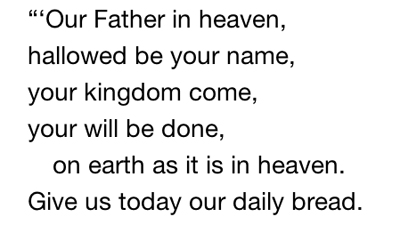
In an article first published by UK-based Ekklesia, SYMON HILL, writing in reference to the recent controversy over the refusal by cinemas to run an ad referencing the Lord’s Prayer, says it’s not surprising people find the prayer offensive…
There has been a minor media storm over the decision of certain UK cinema chains to withdraw a Church of England advertisement featuring the Lord’s Prayer.
Perhaps they were hoping to avoid controversy by avoiding religion. In reality, of course, religion is unavoidable and they have generated far more controversy than would have been the case if they had gone ahead with the advert.
|
Part of the Lord’s Prayer as contained in Matthew 6:9-13 (New International Version) “(T)he Lord’s Prayer is supposed to be offensive – at least to those who benefit from the status quo. One of its most important lines is, ‘Your kingdom come’. A prayer that the Kingdom of God will come is implicitly a prayer that the kingdoms and powers of this world will come to an end.” |
The decision to refuse the advert is pretty ridiculous, but I’m sorry to see that many of its defenders have responded by insisting that the advert is not offensive. There are two issues that are being overlooked.
Firstly, there is an assumption that adverts generally are not offensive. Personally, I am offended by about 90 per cent of adverts. Many of them promote values I don’t believe in, encourage consumerism, champion narrow gender stereotypes and tell me that my life will be better if I buy a load of wasteful junk. I’ve seen army recruitment adverts in cinemas, romanticising war and promoting an organisation rooted in violence and hierarchy.
If you do not share my values, these things may not offend you, but I’m sure some other adverts will. Almost anything that promotes a product or an idea will offend somebody. But I do not have a right not to be offended, and nor do you.
Secondly, the Lord’s Prayer is supposed to be offensive – at least to those who benefit from the status quo. One of its most important lines is, “Your kingdom come”. A prayer that the Kingdom of God will come is implicitly a prayer that the kingdoms and powers of this world will come to an end.
Theologians from Augustine onwards have made tortuous arguments for the idea that Christians can support both the Kingdom of God and the kingdoms they live in. But the Kingdom of God has inherently different values to the idols of money and military might that dominate our world. No-one can serve two masters.
Let’s have a look at the actual content of the Lord’s Prayer. The prayer is attributed in the New Testament to Jesus himself, although it’s likely that only parts of it were said by him and other parts were added by others.
It’s opening words are: “Our Father in heaven, hallowed be your name.”
This may sound fairly innocuous, but in Jesus’ time, the word “father” implied authority over others. Not only was a father seen as in some sense the “owner” of his wife and children, but the Roman Emperor was described as father of the empire. According to the New Testament, Jesus encouraged his followers to “call no-one ‘father’ on earth”. Titles that involve authority belong only to God. This was subversive of both family structures and the emperor.
The prayer continues: “Your kingdom come, your will be done, on earth as in heaven. Give us today our food for the day. Forgive us our debts as we forgive those indebted to us.”
God’s kingdom is an alternative to the kingdoms, nation-states and other powers that we live under. Jesus prayed that God’s will would be done. What does this mean in practice? The next line prays for us to be fed. If God’s will is done, everyone will have enough to eat. Jesus chose this as his first illustration of a world which follows the will of God.
This is followed by a prayer for the cancellation of debts. In some translations, the word is rendered “sins” or “trespasses”. It can refer both to literal financial debts, metaphorical debts and the guilt that comes with sin. It is pretty shocking to call for the cancellation of any or all of these things, and certainly contrary to the values that dominate our world, which insists that debts must be paid.
The prayer goes on: “Save us form the time of trial and deliver us from evil. For the kingdom, the power and the glory are yours, now and forever. Amen.”
Speaking in a setting in which his followers expected persecution, Jesus prayed that God would save them from the trials and evils that they were likely to expect. He finished with a reminder that the power and glory lies in God’s hands, not anyone else’s (such as the rulers and persecutors of this world).
The Lord’s Prayer is a prayer for the overthrow of all existing social conditions. Of course, some people should find it offensive.
This article was first published on Ekklesia. Symon Hill is a Christian author and activist, and an associate of Ekklesia. His latest book, The Upside-Down Bible: What Jesus really said about money, sex and violence, is published this week by Darton, Longman and Todd. For links to more of Symon’s work, please visit www.symonhill.wordpress.com.





